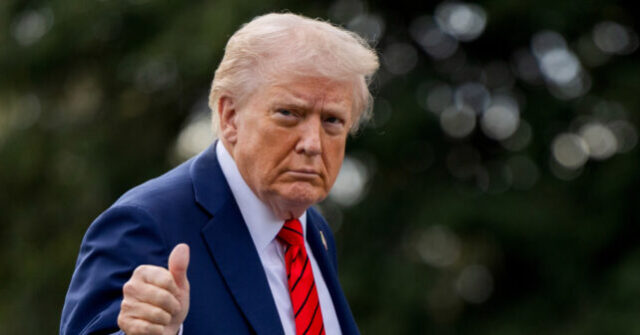President Trump said Friday he would impose an additional 100 percent tariff on Chinese imports and new export controls on critical software, responding to China’s announcement of stringent new restrictions on rare earth minerals.
The measures would take effect Nov. 1, Trump said on Truth Social, potentially raising the average U.S. tariffs on many Chinese goods above 150 percent. Trump also said he saw no reason to proceed with a planned meeting with Chinese President Xi Jinping at the Asia-Pacific Economic Cooperation summit in South Korea later this month.
“It has just been learned that China has taken an extraordinarily aggressive position on Trade in sending an extremely hostile letter to the World, stating that they were going to, effective November 1st, 2025, impose large scale Export Controls on virtually every product they make, and some not even made by them,” Trump wrote.
Trump’s tariff move came one day after China’s Ministry of Commerce announced new export restrictions on rare earth elements, lithium batteries, and related technologies. The rules, which would reportedly take effect in early November, require foreign entities to obtain licenses to export products containing Chinese rare earths comprising as little as 0.1 percent of a product’s value or items manufactured with Chinese rare earth processing technology.
China processes approximately 90 percent of the world’s rare earths, minerals critical for manufacturing semiconductors, electric vehicles, and military equipment. Its dominance in processing gives Beijing significant leverage over global technology supply chains.
China’s rare earth restrictions have upended months of negotiations between Washington and Beijing. The two countries agreed to a tariff truce earlier this year that reduced U.S. duties on Chinese goods from a peak above 140 percent in April. Average U.S. tariffs on China currently stand at 57.6 percent, according to the Peterson Institute for International Economics, while Chinese tariffs on U.S. goods average 32.6 percent.
Trump said other countries had contacted him expressing anger over China’s actions. “Our relationship with China over the past six months has been a very good one, thereby making this move on Trade an even more surprising one,” he wrote.
China also imposed new port fees on U.S. ships this week and launched an antitrust investigation into U.S. chipmaker Qualcomm.
The dispute over rare earths marks a repeat of tensions that erupted earlier this year. In April, China tightened export controls on the minerals, prompting warnings of supply chain disruptions in autos and defense. The two sides eventually relaxed most restrictions after a series of meetings in the U.K. and Europe.
The latest Chinese restrictions could prove more disruptive. Many global technology companies will struggle to demonstrate their products fall below the 0.1 percent threshold, potentially requiring them to seek Chinese government approval for exports.
A cancellation of the APEC meeting would represent a setback for Xi, who has sought continued engagement with Trump to manage bilateral relations.
The Wall Street Journal reported this week that China’s decision to tighten its export controls stemmed from a belief among Chinese officials that they had gained leverage over the U.S. economy and President Trump in advance of the APEC meeting. Officials view recent U.S. responses to Chinese trade threats as “feeble,” the Wall Street Journal reported. Chinese officials sought to force the U.S. to remove tariffs and export controls on technology, especially related to artificial intelligence.
One analyst described China’s restrictions as “an economic equivalent of nuclear war—an intent to destroy the American AI industry,” the Wall Street Journal reported.
The shutdown of the federal government over budgetary disputes may also have emboldened the Chinese regime, which appears to have interpreted it as a sign of governmental disarray.
Trump’s reaction to the export controls suggests that the Chinese miscalculated Trump’s eagerness to make a deal.
Trump said the U.S. would impose export controls on “any and all critical software” starting Nov. 1, though he didn’t specify which products would be affected.
The U.S. maintains significant leverage in advanced semiconductor technology and manufacturing equipment. American companies and their allies control more than 90 percent of global semiconductor equipment manufacturing, and China remains heavily dependent on foreign sources for advanced chips essential to artificial intelligence and military applications.
China’s moves are emboldening trade hawks in the Trump administration, contributing to their arguments that the U.S. may eventually have to decouple its economy from China’s.
Read the full article here
